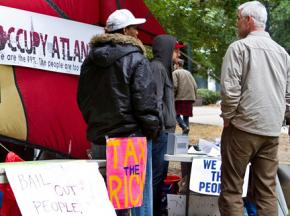Arrested in Troy Davis Park
reports from Atlanta on a police raid to evict the Occupy encampment.
EARLY IN the morning on October 26, Atlanta Mayor Kasim Reed revoked his executive order allowing the Occupy movement to camp in downtown Woodruff Park--renamed Troy Davis Park to honor the innocent death row prisoner who was executed in September.
When police moved in, 52 protesters were arrested, while close to 400 other activists and supporters stood behind police barricades to show their solidarity, in what is surely only the first chapter of the Occupy movement in Atlanta.
Among those arrested at the occupation were prominent African American figures in Atlanta such as Democratic state Sen. and civil rights hero Vincent Fort; former City Council member and now radio personality Derrick Boazman; and Joe Beasley, the southern regional director of the National Rainbow/PUSH Coalition.
Earlier in the evening, Bothaina Kamel, an Egyptian activist against the former Mubarak regime who was part of the Kefaya (Enough) movement and who is now the first female presidential candidate in Egyptian history, visited the occupation to offer words of support to those struggling for democracy here in the U.S. Kamel is on a university speaking tour and happened to be at Kennesaw State University on the night when Reed announced his decision to start arresting protesters when the park closed at 11 p.m.

As the 11 p.m. deadline came closer, outside the police barricades, a core of protesters started loud and energized chants. One of the demonstrators, Christopher Ian Wells, said to the crowd during a speakout, "We are not occupying the park, we are not occupying the streets, we are not occupying our schools, we are occupying our city, we are occupying Atlanta!"
What started with a small group very quickly became larger and more vocal, and the anger of the crowd became more and more palpable as more police arrived. According activists' estimates, there were over 200 police in uniform, 20 mounted police, more than 50 riot police, a mobile command unit and two helicopters.
OCCUPY ATLANTA became more multiracial over the weekend of October 22-23, the dates for a hip-hop festival that was to be held in Troy Davis Park. This year's festival was to honor hip-hop legend Afrika Bambaataa, who came to Occupy Atlanta with words of solidarity for the protest, Troy Davis and Joetavious Stafford, a young Black man who was shot in the back by the city's transit police a week earlier.
At the last minute, Mayor Reed--or Mayor Greed, as the crowd at Troy Davis Park calls him--rejected the permit for the hip-hop festival that had been applied for months ago, apparently out of fear that the occupation would grow stronger as a result.
Previously, Reed, who is Black, talked about how the city needed to be "protected" against the threat of "violent" hip-hop concerts. Then the City Council increased the mandatory security fee for the concert to a whopping $11,000, with little notice--and city officials declared that the festival would not be allowed to take place. Roughly 800 people came to the part anyway, but the festival was quickly shut down by police. However, some of those who tried to attend stayed on to work with Occupy Atlanta.
From this point on, police began to intimidate protesters with various tactics to make it seem like a raid and mass arrests could happen at any time. For example, squads of officers were brought to the park in prisoner transport units, only for them to be picked up later and returned to a different corner. False alarms about arrests became the norm every evening, and protesters started feeling the effects of stress.
On the Monday after the weekend, Reed announced he was revoking a previous executive order that had kept the park open to occupiers until November 7. He complained about alleged disruptive behavior by protesters and said the city had spent $100,000 for a police presence over the weekend, with officers working 12-hour shifts and overtime.
At a press conference at the occupation that evening, Derrick Boazman chastised the mayor. "He says he's paid $100,000 in one day, when he's forcing us to give $2.5 million tax breaks to some of the biggest corporations in Atlanta," he said. "We have a Black police chief here in Atlanta, but he's acting more like a Bull Connor. I'm not looking for a fight, but I will stand and fight if the fight comes to me."
The occupation has made the race and class divide of the city clear to many Atlanta residents. As Occupy Atlanta became more and more multiracial, the police presence became bigger, and harsher in its tactics.
We hope this will be the beginning of a multiracial people's movement coming from the bottom up in the South. Whether or not a re-occupation of the park begins, it will be difficult for all those involved to forget the Black, Brown and white arms linked together in a common struggle. If there is one thing to take away from the events of these past few weeks, it is the beginning of this struggle.


